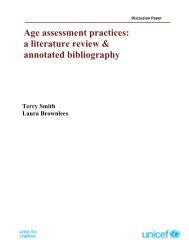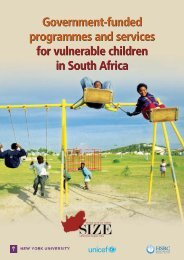Third and Fourth Periodic Report on CRC - Unicef
Third and Fourth Periodic Report on CRC - Unicef
Third and Fourth Periodic Report on CRC - Unicef
Create successful ePaper yourself
Turn your PDF publications into a flip-book with our unique Google optimized e-Paper software.
<str<strong>on</strong>g>Third</str<strong>on</strong>g> <str<strong>on</strong>g>and</str<strong>on</strong>g> <str<strong>on</strong>g>Fourth</str<strong>on</strong>g> <str<strong>on</strong>g>Periodic</str<strong>on</strong>g> <str<strong>on</strong>g>Report</str<strong>on</strong>g><br />
4.3 Preservati<strong>on</strong> of identity<br />
Bangladeshi nati<strong>on</strong>ality can be acquired by birth, descent, migrati<strong>on</strong> or naturalizati<strong>on</strong>. A child's nati<strong>on</strong>ality is<br />
based <strong>on</strong> the nati<strong>on</strong>ality of his or her father. Prevailing law also does not allow children with a Bangladeshi<br />
mother <str<strong>on</strong>g>and</str<strong>on</strong>g> a n<strong>on</strong>-Bangladeshi father who were not born in Bangladesh from acquiring their mother's rather than<br />
their father's nati<strong>on</strong>ality <str<strong>on</strong>g>and</str<strong>on</strong>g> from acquiring dual nati<strong>on</strong>ality.<br />
Previously <strong>on</strong>ly father's name would suffice, but now-a-days wherever applicable (or deemed necessary) writing<br />
both the parents names are m<str<strong>on</strong>g>and</str<strong>on</strong>g>atory.<br />
Bangladesh is not a party to any internati<strong>on</strong>al or regi<strong>on</strong>al refugee instruments, nor does it have any legislative<br />
or administrative provisi<strong>on</strong>s for political asylum-seekers. However, there exists traditi<strong>on</strong> of providing refuge to<br />
pers<strong>on</strong>s fleeing from their own countries whose human rights are violated there. Support of fundamental human<br />
rights <str<strong>on</strong>g>and</str<strong>on</strong>g> freedoms are guaranteed in the C<strong>on</strong>stituti<strong>on</strong> for instance, asserts that the State shall support<br />
oppressed people throughout the world waging a just struggle against imperialism or racism.<br />
In 1991/92 some 250,000 Rohinga people from Myanmar sought refuge in Bangladesh. They were given prima<br />
facie refugee status <str<strong>on</strong>g>and</str<strong>on</strong>g> provided with protecti<strong>on</strong> <str<strong>on</strong>g>and</str<strong>on</strong>g> assistance, al<strong>on</strong>g with their children with the support of<br />
United Nati<strong>on</strong>s High Commissi<strong>on</strong> for Refugees (UNHCR). However, am<strong>on</strong>g other supports, birth registrati<strong>on</strong> of<br />
Rohingya refugee children is being properly d<strong>on</strong>e.<br />
Biharies are the n<strong>on</strong>-Bengali populati<strong>on</strong>, most of them opted for Pakistan <str<strong>on</strong>g>and</str<strong>on</strong>g> migrated from the Indian state of<br />
Bihar to the former East Pakistan before <str<strong>on</strong>g>and</str<strong>on</strong>g> after independence of India <str<strong>on</strong>g>and</str<strong>on</strong>g> Pakistan. On the emergence of<br />
Bangladesh following the War of Independence in 1971, the Urdu speaking Biharies again opted for Pakistan.<br />
The children of the 'Biharies' represent the largest group of stateless children in Bangladesh.<br />
4.4 Freedom of expressi<strong>on</strong><br />
The press in Bangladesh is very large, active <str<strong>on</strong>g>and</str<strong>on</strong>g> keen <strong>on</strong> development issues. Bangladesh enjoys a<br />
reas<strong>on</strong>ably free print media with hundreds of daily <str<strong>on</strong>g>and</str<strong>on</strong>g> weekly publicati<strong>on</strong>s providing a forum for wide range of<br />
views. Press here also enjoys a str<strong>on</strong>g lobbying role <str<strong>on</strong>g>and</str<strong>on</strong>g> has the potential to play an important part in setting<br />
the agenda for development <str<strong>on</strong>g>and</str<strong>on</strong>g> political issues. The Bangladesh press is very supportive to children's causes<br />
<str<strong>on</strong>g>and</str<strong>on</strong>g> devotes c<strong>on</strong>siderable space <strong>on</strong> reporting child rights <str<strong>on</strong>g>and</str<strong>on</strong>g> development issues. An initiative called Shishu<br />
Prakash, a children's news agency which empowers 640 young reporters through out the country.<br />
Apart from government-owned Radio (Bangladesh Betar) <str<strong>on</strong>g>and</str<strong>on</strong>g> Bangladesh Televisi<strong>on</strong> (BTV) there exist private<br />
radio <str<strong>on</strong>g>and</str<strong>on</strong>g> satellite channels. Around 10 private TV channels <str<strong>on</strong>g>and</str<strong>on</strong>g> 4 radio stati<strong>on</strong>s (FM b<str<strong>on</strong>g>and</str<strong>on</strong>g>) are in operati<strong>on</strong>,<br />
including a good number of internati<strong>on</strong>al <strong>on</strong>es. Radio is still very popular in rural areas <str<strong>on</strong>g>and</str<strong>on</strong>g> is probably the <strong>on</strong>ly<br />
medium that reaches the grass root people in times of emergency <str<strong>on</strong>g>and</str<strong>on</strong>g> disasters. Bangladesh Betar has 10<br />
stati<strong>on</strong>s nati<strong>on</strong>wide. BTV is the state owned channel <str<strong>on</strong>g>and</str<strong>on</strong>g> therefore pursues the government development<br />
policies <str<strong>on</strong>g>and</str<strong>on</strong>g> programmes. BTV still has the largest audience in Bangladesh estimated at more than 50 percent.<br />
BTV telecasts programmes <strong>on</strong> rights of children in collaborati<strong>on</strong> with different agencies. BTV airs 25-minute<br />
daily programmes <str<strong>on</strong>g>and</str<strong>on</strong>g> 3 to 5 minutes of public service spots <strong>on</strong> priority messages for children <str<strong>on</strong>g>and</str<strong>on</strong>g> women. BTV<br />
programmes have increased child participati<strong>on</strong>. BTV produced public service spot <strong>on</strong> Vitamin A Plus <str<strong>on</strong>g>and</str<strong>on</strong>g> also<br />
airs regularly Meena episodes.<br />
In recent years UNICEF, ILO, USAID <str<strong>on</strong>g>and</str<strong>on</strong>g> organizati<strong>on</strong>s working with children have taken initiatives to strengthen<br />
partnership with private satellite channels in the country, covering, am<strong>on</strong>g others, the issues of child labour, child<br />
rights, birth registrati<strong>on</strong>, girls' educati<strong>on</strong> <str<strong>on</strong>g>and</str<strong>on</strong>g> others. A UNICEF sp<strong>on</strong>sored documentary produced by ATN<br />
38
















